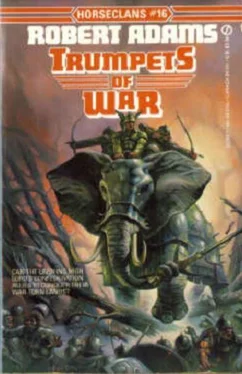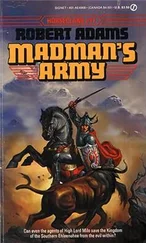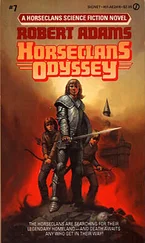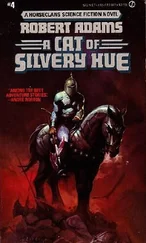“Now, I’m off for the palace, a hot bath and a soft, warm bed.”
Four days later, Captain Thoheeks Portos marched the rest of the cavalry, the infantry, the elephants and the trains into the permanent camp below Mehseepolis—men, animals and vehicles all mud-caked, half frozen and miserable. Even the sturdy, uncomplaining elephants were showing irritability bred of the exhaustion of pushing and pulling wagon after wagon out of mudhole after mudhole day after day in icy rain or clammy mist.
“That abortion of a so-called road,” Portos told Tomos after the troops had been formed up and dismissed, “has got to go to the top of the repair list. All the logs are rotted out; the only bridge that is still there, even, is the old, narrow stone one over Yahlee River ; to cross the rest of the streams we had to send out patrols to seek fords. In one place there was no ford to be found, so the artificers and pioneers had to swim a treacherous and powerful current with lines in their teeth, haul over and set cables, then set the elephants to stand upstream in six feet of rushing water to partially break its force while men and horses were swum and wagons were floated across. That had to be done twice—once on the march down there, once on the march back—and that is what cost us our only deaths—nine men, two horses and two mules.
“If I hadn’t believed fully that those barbarians can really talk to those elephants, Tomos, I’d have to, after this campaign. They can get those beasts to do things that I’ve never before seen either a draught elephant or a war-elephant perform, not in all my years of warring with and against armies that utilized them.
“And the efforts of those three elephants is all that got our trains back up here over those quagmire roads, too. Without them, we’d have been putting down draught animals right and left; as it was, when a wagon mired too deeply for the animals and the men to drag and pry it out, one of the elephants would put her forehead against the back of it and pop it out like the stopper from a bottle, then the team would be rehitched and so proceed to the next impassable stretch of slimy road.
“We didn’t get to better roads and slightly drier weather until yesterday. Did the barbarian cavalry and Thoheeks Grahvos make it back yet?”
Tomos nodded, smiling. “Four days ago.”
Portos hissed between his teeth. “And how many horses did they kill and founder?”
“None,” the sub-strahteegos replied, adding, “I know, I know, it sounds impossible, but it’s true, nonetheless. Their secret, so Thoheeks Grahvos avers, is that they never push any one mount too hard for too long. That’s what their oversized remuda is for, you see. They change horses several times each day; they seldom ride really fast, but they stay in the saddle and moving for eighteen and twenty hours a day, every day, until they get where they’re headed.”
The tall captain shook his head. “Oh, they’re all tough little bastards, I’ll be the first to grant you that much. High Lord Milos chose well when he chose such as them. I’m told that they went through the best that Kehnooryos Ehlahs could field, years agone, like shit through a goose. And they went on to clobber you Karaleenoee pretty thoroughly, too, didn’t they?”
Tomos sighed and nodded soberly. “That they did, friend Portos, that they assuredly did, over and over again, year after year. We kept on fighting . . . and losing men and lands and battles, for we of Karaleenos are as stubborn and as proud as any other people of the Ehleen race. Hell, we’d probably still be fighting them had not your late and unlamented High King Zastros poised so great a threat that King Zenos decided to make stand with High Lord Milo, Lord Djefree, Lord Alexandros and the rest against a common foe.
“But back to the here and now, Portos. Did you see on your march aught of the mercenary cavalry troop formerly employed by Hahkmukos? Grahvos seemed to think they might be headed back here seeking an employer.”
“Oh, yes, I’d meant to mention that matter earlier, Tomos,” Portos answered. “They’re with my cavalry column, what’s left of them as can still sit a horse, that is. About two thirds of the original troop are alive or were this morning, but most of them are wounded to one degree or another. We came on them camped and licking their wounds three days’ march out of the Duchy of Ahndros.”
“They ran into bandits, did they?” asked Tomos.
Portos pursed his lips. “In a manner of speaking, yes. But, no, just another rendition of the same sad old story: their newly elected captain and a brace of his close friends tried to sneak away one night with the best of the loot of Hahkmukos’ camp, they were caught and killed, and then a general melee ensued. A day later, we came across them. We put down the ones who were clearly death-wounded, of course, and stuffed the ones who couldn’t ride into the ambulance wagons. Our eeahtrohsee have done the best they could for them, but even so, two or three a day have died on the march. What disposition do you want made of them?”
Tomos shrugged. “Well, Grahvos wanted to hire them on for our army, but parcel them out to various existing units. I’ll tell you, take the ones you want of them, if any, and funnel the rest into that squadron of light cavalry that’s being raised. That’s the best I can figure, just now.
“By the way, while the force was down there, Thoheeks Sitheeros brought over an officer from Iron Mountain and introduced him to me. He’s the thoheeks’ war-elephant trainer, one Master of Elephants Laskos. What’s wrong? You know him or something of him, Portos?”
“I’ve never met him, no, Tomos, but, yes, I surely do know of him,” replied Portos, “and I wonder just who twisted just what tails to get him down here. Sitheeros treasures him, and rightly so, too. That man was King Hyamos’ captain-general of the war-elephants. He developed ways of using elephants that no one had ever before known or thought about.
“But he and the usurper, Fahrkos, couldn’t get along. He was declared outlaw and disappeared; for all that Fahrkos had the lands scoured over and over, he never could catch him. Now we know that most of the years he was missing, he was holed up at Iron Mountain with Thoheeks Sitheeros.
“He’s not an Ehleen, you know.”
Tomos nodded. “Yes, I’d thought he didn’t look like one, and he owns a singular accent in his speech, too; I’ve never heard one like it, I don’t believe. Where did he come from?”
Portos shrugged. “Maybe Sitheeros knows, but I don’t. There’re tales about him, though; some say that he came south from the Black Kingdoms, up near Kehnooryos Mahkedohnya, others aver that he is from some land beyond the Eastern Ocean and came by way of Lord Alexandros’ Pirate Isles, long ago, then there are those who think that he came from some place far to the west, beyond the Sea of Grass. I’ve never given much thought to it, any of it.
“What would you, who have at least seen him, say is his age?”
Tomos knitted up his weathered brows. “Oh, I don’t know, fifty, sixty, maybe. Why?”
“Because,” said Portos, “not only was he King Hyamos’ elephant trainer, he also served Hyamos’ father, old King Vitahlyos, which means that the man—who was a man grown, they say, when first he came to these lands of ours—must be in his eighties anyway, if not looking back at his ninetieth year.”
Tomos’ dark eyes widened perceptibly. “You think . . . ? Could it be possible? Might he be one such as High Lord Milo and the High Lady Aldora, then?
But surely, sometime over the years he has dwelt in Ehleen lands, some kooreeos or other has put him to the Test?”
Portos shook his head. “Maybe, in Karaleenos or Kehnooryos Ehlahs or some other land where religion, the old religion, has maintained a stronger hold than here, in the south. But the last dynasty—that of which Hyamos was the last king—had little use for the church and did much to weaken it, strip it of its onetime wealth and power over the nobles and commoners.
Читать дальше












